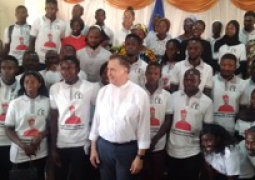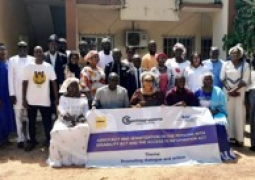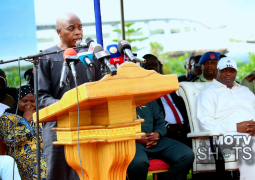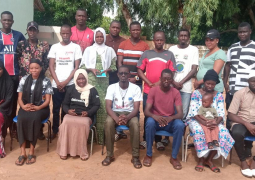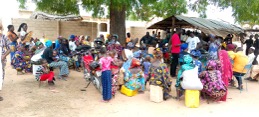
Some of the steps carried out were community mobilization and sensitisation to encourage wider community participation, capacity building of community structures such as VDCs, GRM and IPC Network members to make them function effectively.
Mr. Dibba made the remarks at Arafat village. The CRR North teams are expected to enroll 1609 household beneficiaries.
He said that they are hopeful of completing their Central River Region (CRR) North Nafa Program enrolment of beneficiaries by the scheduled date and do a call back if need be just to ensure ‘we meet the target beneficiary households ear marked for enrolment.’
He pointed out that they want to enroll everybody that is listed as extremely poor household in the region, noting that they have not faced major challenges during their enrolment of beneficiaries. This is because we are using the community structures such as the Village Development committee members, Grievance Redress mechanism and Inter Personal Communication Members to mobilise the beneficiary household members.
“The project encourages household heads to nominate their women to be principal recipients and most of them have adhered to it,” he added, saying he has not come across a male principal recipient. However, he said it is within the rights of men to also be principal recipients. This is because of the many responsibilities of women at household level.
It is important to note that the cash transfer goes with Social and Behavioral Change Communication notably on Health and Nutrition, Gender based Violence, entrepreneurship and financial literacy. This will help in adoption of desirable behaviors and build livelihood skills thus building household resilience.
He said their challenge within the region had to do with people with similar as well as same names but noted that they were adequately dealt with during the community validation of the extreme poor household list.
He also pointed out the fact that it has just started raining and most of them are farmers, they are usually busy in their farms hence delay in the start of enrolment in some communities.
The other change reported by Mr. Dibba is the movement of the people within and outside the region as social beings as most are engaged in social activities e.g traditional weddings etc.
The Nafa Program component of The GambiaSocial Safety Net Project (a US$ 31 million project) isjointly funded by the World Bank and the Government of The Gambia.
The National Nutrition Agency (NaNA), Directorate of Social Welfare and Department of Community Development are implementing the Nafa Program as part of The Gambia Social Safety Net Project (SSNP) which aims to strengthen the coordination of social assistance activities and increase the inclusion of the extremely poor in the Nafa Program.
The Nafa Program is a combination of Cash Transfer and Social and Behavioural Change Communication (SBCC) that is being implemented in phases.
The first phase involved three Districts (Foni Bintang in West Coast Region, Nianija in the Central River Region and Wulli West in the Upper River Region.) The project is now rolling out to the 17 other districts across the country.
The project is targeting 15,606 extreme poor households which equates to approximately 40 percent of the extremely poor households in The Gambia. The project targets the 20 poorest districts in The Gambia.
The Project Development Objective (PDO) is to improve the coordination of social assistance activities, provide temporary social assistance support to rural households in the wake of COVID-19, and increase inclusion of the extreme poor in the Nafa Program.
Amadou Jaiteh of the Department of Community Development said the project is evolving following its piloting in 3 districts, adding that the enrolment is moving as planned.
Lamin Ceesay of the Directorate of Social Welfare in his remarks at Tento Madi Chebo urged beneficiaries not to spend the entire money when they receive it but ensure they invest part of it to improve their livelihoods at the end of the project.
Awa Willan, a principal recipient at Arafat said they would invest their money in things that would benefit them in future as well as use part of it for their feeding.
Samba Sarjo Chune, a procurator at Kerr Samba Sira said when they received the money, he would support his wife’s business to ensure they are able to sustain themselves at the end of the project.
Adama Loum, a principal recipient at Kerr Samba Sira said she would establish a backyard garden and use the harvest when cooking to ensure they eat daily balanced diets.


